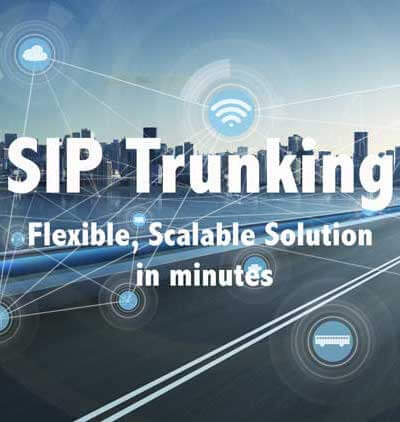How to troubleshoot common SIP problems? SIP, or Session Initiation Protocol, is a popular protocol used for VoIP communications. As with any technology, issues can arise with SIP, which can impact the quality and reliability of your communications. Here are some...
The Future of VoIP Reselling: Trends and Opportunities
The Future of VoIP Reselling: Trends and Opportunities
VoIP is a communication technology that allows voice communication over the internet instead of traditional phone lines. In recent years, VoIP has become increasingly popular due to its cost-effectiveness, scalability, and flexibility. With VoIP, businesses and individuals can make voice calls, video calls, and send messages using a broadband internet connection. According to a report by MarketsandMarkets, the global VoIP market size is expected to grow from $20.28 billion in 2020 to $31.8 billion by 2026, at a CAGR of 7.1% during the forecast period. This growth can be attributed to the increasing adoption of cloud-based communication solutions, the expansion of the global telecommunication industry, and the rising demand for cost-effective communication solutions. As a result, the VoIP industry presents significant opportunities for resellers who can offer innovative solutions that meet the evolving needs of businesses and individuals.
Overview of VoIP Reselling:
VoIP reselling involves purchasing VoIP services from a VoIP service provider and selling them to customers at a markup. The reseller typically focuses on marketing and sales, leaving the technical aspects of the service to the service provider. The VoIP reseller can offer a range of VoIP services, including hosted PBX, SIP trunking, and IP telephony.
Trends in VoIP Reselling:
-
- Rise of Cloud-Based VoIP:
One of the major trends in the VoIP industry is the rise of cloud-based VoIP. Cloud-based VoIP systems offer several benefits over traditional on-premise systems, such as scalability, flexibility, and cost-effectiveness. According to MarketsandMarkets, the global cloud-based VoIP market size was valued at $20.4 billion in 2020 and is expected to reach $42.2 billion by 2026, growing at a CAGR of 12.3% from 2021 to 2026.
Resellers can take advantage of this trend by offering cloud-based VoIP solutions to their customers. By offering cloud-based VoIP, resellers can provide their customers with a cost-effective, scalable, and flexible solution that meets their communication needs.
-
- Increased Demand for Unified Communications:
Unified communications (UC) is a technology that integrates multiple communication channels, such as voice, video, and messaging, into a single platform. According to MarketsandMarkets, the global unified communications market size was valued at $57.5 billion in 2020 and is expected to reach $167.1 billion by 2026, growing at a CAGR of 19.7% from 2021 to 2026.
VoIP Resellers can capitalize on this trend by offering UC solutions to their customers. By offering UC solutions, resellers can help their customers improve employee productivity and collaboration.
-
- Growing Interest in AI-Powered VoIP:
Artificial Intelligence (AI) is being used in many industries, including telecommunications. AI-powered VoIP solutions can improve the quality of calls, reduce call drops, and provide personalized customer service. According to MarketsandMarkets, the global AI in the telecommunication market size was valued at $651.6 million in 2020 and is expected to reach $2.8 billion by 2026, growing at a CAGR of 27.1% from 2021 to 2026.
As AI technology continues to evolve, there will be more opportunities for VoIP resellers to offer AI-powered solutions to their customers. By offering AI-powered solutions, resellers can provide their customers with a better quality of service and improve customer satisfaction.
-
- Expansion of VoIP in Emerging Markets:
VoIP is gaining popularity in emerging markets due to its cost-effectiveness and flexibility. According to Grand View Research, the VoIP market size in Africa was valued at $2.45 billion in 2020 and is expected to reach $6.17 billion by 2027, growing at a CAGR of 14.3% from 2021 to 2027. Similarly, the VoIP market size in Asia Pacific was valued at $18.85 billion in 2020 and is expected to reach $47.52 billion by 2027, growing at a CAGR of 13.2% from 2021 to 2027.
VoIP adoption is growing rapidly in emerging markets, such as Africa and Asia. This presents a significant opportunity for VoIP resellers to tap into these markets and offer their services to businesses and individuals in these regions.
-
- Increased Adoption of VoIP by Small and Medium-sized Businesses
Small and medium-sized businesses (SMBs) are increasingly adopting VoIP solutions due to their cost-effectiveness, flexibility, and scalability. According to a report by Transparency Market Research, the global VoIP services market for SMBs is expected to reach $30.8 billion by 2026, growing at a CAGR of 13.8% from 2018 to 2026.
Resellers have the opportunity to leverage this trend by directing their efforts towards small and medium-sized businesses (SMBs) and presenting them with VoIP solutions that cater to their communication requirements. By providing SMBs with cost-effective and flexible VoIP solutions, resellers can play a vital role in enhancing their communication capabilities and reducing their expenses.
Opportunities in VoIP Reselling:
-
- White Label VoIP Services:
VoIP resellers can take advantage of white label VoIP services, which allow them to rebrand and resell VoIP services under their own name. This approach allows resellers to establish their own brand and differentiate themselves from competitors.
-
- Bundling Services:
VoIP resellers can bundle VoIP services with other related services, such as internet and cloud-based storage, to provide a more comprehensive solution to their customers. This approach can help resellers increase their revenue and customer loyalty.
-
- Targeting Niche Markets:
VoIP resellers can target specific niche markets, such as healthcare or finance, and offer tailored solutions to meet their unique needs. This approach can help resellers differentiate themselves and establish themselves as experts in a particular industry.
-
- Offering Customized Solutions:
VoIP resellers can offer customized solutions to their customers, based on their specific needs and preferences. This approach can help resellers establish long-term relationships with their customers and increase customer loyalty.
Resellers can take advantage of the growing popularity of VoIP by focusing on small and medium-sized businesses (SMBs) and providing them with customized communication solutions. By offering SMBs cost-effective and flexible VoIP solutions, resellers can help improve their communication capabilities while also reducing costs. SMBs often have limited resources, so by providing them with innovative and affordable VoIP solutions, SIP Trunking resellers can help them stay competitive in today’s market. This presents a significant opportunity for resellers who can cater to the unique communication needs of SMBs and help them thrive.
Why to manage a phone system
when you can get for free.
New Posts
How to troubleshoot common SIP problems?
Maximizing Reach and Engagement: The Top Benefit of SMS Marketing for Your Agency
Maximizing Reach and Engagement: The Top Benefit of SMS Marketing for Your Agency As a marketing agency, you know that reaching and engaging with your target audience is key to your success. SMS marketing can be a powerful tool to help you achieve this goal. By...
SIP Trunking and Disaster Recovery: Ensuring Business Continuity
SIP Trunking and Disaster Recovery: Ensuring Business Continuity Disasters, whether natural or man-made, can significantly impact a business's operations. They can cause disruptions, lead to financial losses, and even result in the closure of the business. As such,...
Learn more about our Products
Visit SIP Trunking Pricing to see which plan best suits your business!
Our plans have been packaged together to give you optimum output.








